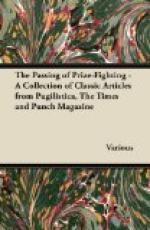As for much of the joinery-work, could we have prettier mechanics than Sir James GRAHAM and Sir Edward KNATCHBULL? When we remember their opinions on the Corn Laws, and see that they are a part of the cabinet which has already shown symptoms of some approaching alteration of the Bread Tax—when we consider their enthusiastic bigotry for everything as it is, and Sir Robert PEEL’S small, adventurous liberality, his half-bashful homage to the spirit of the age—sure we are that both GRAHAM and KNATCHBULL, to remain component members of the Peel Cabinet, must be masters of the science of dove-tailing; and hence, the men of men for the joinery-work of the new Houses of Parliament.
Again how many members from their long experience in the small jobbery of committees—from their profitable knowledge of the mysteries of private bills and certain other unclean work which may, if he please, fall to the lot of the English senator—how many of these lights of the times might build small monuments of their genius in the drains, sewerage, and certain conveniences required by the deliberative wisdom of the nation? We have seen the plans of Mr. BARRY, and are bound to praise the evidence of his taste and genius; but we know that the structure, however fair and beautiful to the eye, must have its foul places; and for the dark, dirty, winding ways of Parliament—reader, take a list of her Majesty’s Commons, and running your finger down their names, pick us out three hundred able-bodied labourers—three hundred stalwart night workmen in darkness and corruption. We ask the country, need it care for the strike of Peto’s men (the said Peto, by the way, is in no manner descended from Falstaff’s retainer), when there is so much unemployed labour, hungering only for the country’s good?
We confess to a difficulty in finding among the members of the present Parliament a sufficient number of stone-squarers. When we know that there are so few among them who can look upon more than one side of a question, we own that the completion of the building may be considerably delayed by employing only members of Parliament as square workmen: the truth is, having never been accustomed to the operation, they will need considerable instruction in the art. Those, however, rendered incapable, by habit and nature, of the task, may cast rubbish and carry a hod.
We put it to the patriotism of members of Parliament, whether they ought not immediately to throw themselves into the arms of Peto and Grissell, with an enthusiastic demand for tools. If they be not wholly insensible of the wants of the nation and of their own dignity, Monday morning’s sun will shine upon every man of her Majesty’s majority, for once laudably employed in the nation’s good. How delightful then to saunter near the works—how charming then to listen to members of Parliament! What a picture of senatorial industry! For an Irish speech by STANLEY, have we not the more dulcet music of his stone-cutting saw? Instead of an oration from GOULBURN, have we not the shrill note of his ungreased parliamentary barrow? For the “hear, hear” of PLUMPTRE, the more accordant tapping of the hammer—for the “cheer” from INGLIS, the sweeter chink of the mason’s chisel?




